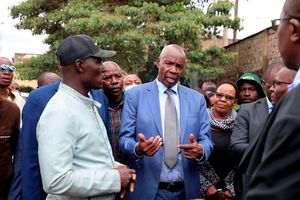Premium
Women of firsts in Meru: Before Kawira, there was Anarita Karimi Njeru

Meru Governor Kawira Mwangaza (centre) at Parliament Buildings after senators voted against her impeachment.
Students of law know the Anarita Karimi Njeru case. The 1979 ruling in which the first Meru woman MP lost her seat represented one of those moments when the Court of Appeal said it did not have jurisdiction to hear an appeal from the High Court on matters touching on fundamental rights.
By walking away, the Kenyan judiciary simply abandoned the citizens to the Executive. They deserted duty. It took decades to undo that judicial mess and most people facing human rights abuse found the door locked.
This week, the Senate refused to abandon Meru Governor Kawira Mwangaza to misogyny forces out to use unorthodox means to install a self-styled patriarchal regime.
It first protected the Meru voters from a coup inspired by a political witch-hunt and Kawira from gender-based harassment perpetuated by a section of Meru leaders.
Kawira may not be a paragon of virtue, and she admits as much. But her detractors staged “muthirigu” – some dance song mocking the governor, her personality, and her leadership – and sought to create a monster mother figure at the grassroots before heading to the Senate to sanitise their mischief. Twice, it never worked.

Meru Governor Kawira Mwangaza (Centre) and her counsel Elisha Ongoya (Left) and Elias Mutuma (Right) before the Senate Nairobi on Tuesday, November 7, 2023.
The famous Karimi Njeru case arose from a similar political mischief, only that the judiciary failed to protect the MP. It was the era of Attorney-General Charles Njonjo, who used to control MPs like Russian marionettes. It was also the time that Kenya had retained some contract judges from Britain who, according to critics, ruled in favour of the Executive to win an extension of their contracts. These judges were part of British Overseas Development Aid and were said to be open to manipulation.
Under the terms of engagement and contract, the renewal of the contracts was left at the mercy of the Executive. This became evident later when some British judges, Norbury Dugdale, David Porter, and Chief Justice Robin Hancox, were criticised for making rulings that always favoured the government.
But not all expatriate judges fell prey to the executive manoeuvres: Justice Derek Schofield and Patrick O’Connor resigned in protest.
We also had the 1969 case where Justice G. Farrel and Acting Chief Justice Dalton ruled against the State and reduced Kenya People’s Union Vice President Bildad Kaggia’s jail term from 12 to six months. The next day, President Kenyatta appointed Kitili Mwendwa as the Chief Justice in what was seen as the State’s response. A few days later, Justice Farrel retired. Mwendwa did not stay long after he was implicated in a coup and forced to resign.
It is essential to read the Karimi Njeru ruling within that broader picture, for there is usually a rich history of executive interference with judicial independence – or, as in recent cases, where some non-state actors have taken the judiciary hostage. Prof Makau Mutua once wrote that “legal systems cannot function effectively to guarantee basic rights if the private bar is not free of state coercion”.
Njeru had graduated from St Teresa, Winona in Minnesota in 1971 with a Bachelor of Education and was the headmistress of St Mary’s Girls’ Secondary in Egoji before she entered politics in 1974. Young but ambitious, she came a distant fourth in the Meru Central parliamentary seat race won by Kabeere M’Mbijjiwe, a University of Aberdeen BSc graduate in agriculture. But after a successful petition, M’Mbijjiwe lost his seat and was barred from vying. One of the grounds was that he used witchcraft to win the election, and, interestingly, Njeru testified in support of M’Mbijjiwe. Thus, when he was barred from vying, she gained from that loss.
In the subsequent by-election, Njeru won the seat and became one of the five female MPs in the third Parliament. The others were Grace Onyango (Kisumu Town), Eddah Gachukia (nominated), Dr Julia Ojiambo (Busia Central), and Nyiva Mwendwa (Kitui West). In Parliament, Njeru had distinguished herself as a troublemaker.
The other vocal female MP, Chelagat Mutai, had been silenced in 1975 after she was jailed for ostensibly leading her landless constituents to occupy Ziwa farm, an expansive colonial-era sisal plantation.
The court had been told that Mutai, then 26 and as Kenya’s youngest MP, had incited her constituents. The court heard that she was a perennial misfit: that she had misbehaved at school, had been expelled from the University of Nairobi for publishing a banned magazine, and was “anti-authority” and “radical”.
Though the High Court found that the trial magistrate improperly admitted this evidence, the judges said they were satisfied that the admission of this evidence “did not in fact prejudice or cloud the mind of the magistrate, since he was at pains to correct the matter in his judgment”.

Embattled Meru County governor Kawira Mwangaza before Senate, Nairobi County on Wednesday, November 8, 2023 during her impeachment motion.
Though Mutai won the Aldai seat again in 1979, she was forced to flee the country in October 1981 after being accused of making false mileage claims totaling Sh69,000.
During the same period, James Orengo was also forced into exile after a series of annoying remarks against Njonjo.
At one point, he irritated Njonjo after observing that he “dresses like the Queen’s Butler”. Orengo must have misjudged Njonjo’s powers after he had retired as Attorney-General and was MP for Kikuyu.
“What did he say?” asked an infuriated Njonjo. It was a high-voltage question, and Njonjo always knew where to square such fights: At the Judiciary.
In those days, Njonjo had formed the habit of carrying out investigations against vocal MPs and held the evidence as a silencing tape.
During the 1974 elections, Njonjo was against the election of Mark Mwithaga as Nakuru Town MP. As the campaigns progressed, a case surfaced where it was alleged that Mwithaga had once beaten his wife.
The case was rushed through the courts, and by the voting day, Mwithaga had been jailed for six months. He won by a landslide but could not be sworn in since he was in jail.
Such was the Judiciary that Karimi Njeru was to face as she fought some powerful forces within the Executive. Evidence was found that when she was the headmistress of St Mary’s Girls’ Secondary, there was a discrepancy in the accounting, and some money was missing for the 1973 financial year.
Njeru was alleged to have stolen Sh 46,574, and to nail her, the Attorney-General sent one of the senior State prosecutors, Kihara Mutu, to lead the case. Anarita was denied an adjournment to enable her to call a witness, and the case proceeded. She then appealed after being convicted and sentenced – partly based on that denial.
Mutu argued that “it was too late for the applicant now to seek redress because she could and should have sought it while on trial in the subordinate court; and that, having appealed or sought to appeal to this Court against her convictions and sentences, she should not be allowed to come here again for what is in effect the same purpose”.
He argued that the MP was “attempting, under the guise of a Constitutional reference, to get us to resolve grounds of appeal which this Court had said it would not entertain”.
Her lawyer asked the court to protect and invoke “the spirit of the Constitution (and) protect a fundamental right”. It refused. Instead, Justice Trevelyan and Justice Hancox made the famous ruling that: “if a person is seeking redress from the High Court on a matter which involves a reference to the Constitution, it is important (if only to ensure that justice is done to his case) that he should set out with a reasonable degree of precision that of which he complains, the provisions said to be infringed, and the manner in which they are alleged to be infringed”.
That became the reference point for several decades, and drafters of petitions had to do so with much precision and standard. It would take 40 years before the Anarita Karimi Njeru principle was reviewed – or expanded – by the Mumo Matemo case.
While she was forced out of politics and went back to teaching, Njeru’s fall is attributed to the skulduggery patriarchal politics that could not stand women in leadership. Only a few dared to enter the rough terrain and as the Kawira saga reveals, women are still facing the forces of misogyny camouflaged as politicians.
- [email protected] | @johnkamau1





